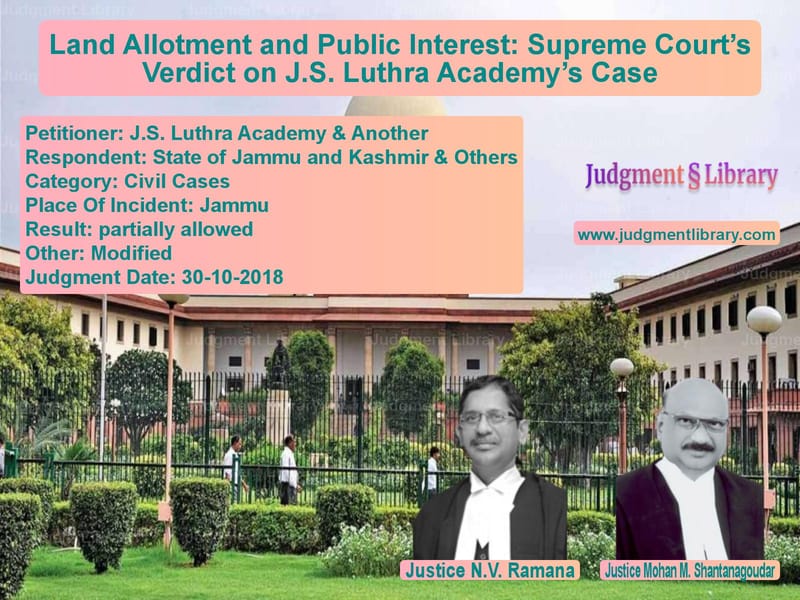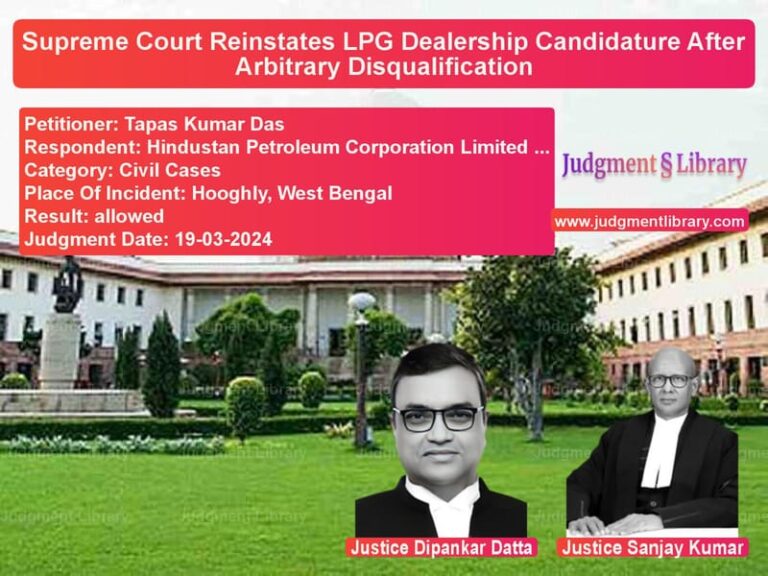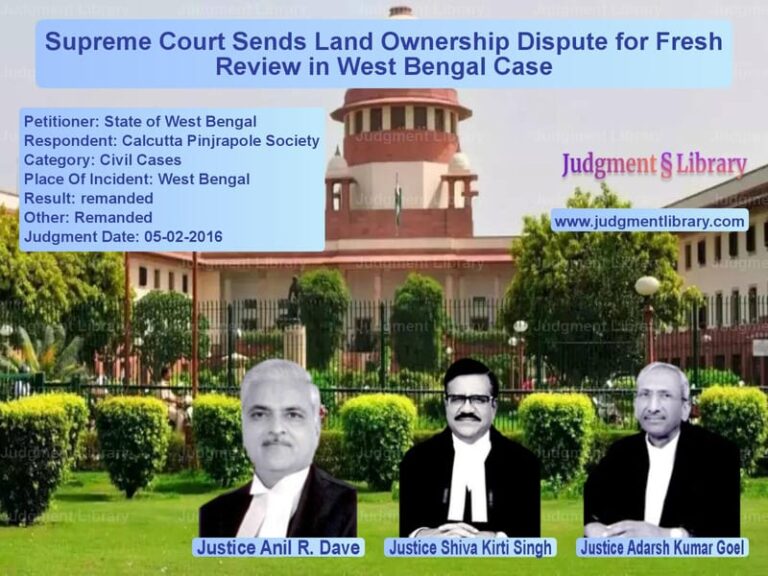Land Allotment and Public Interest: Supreme Court’s Verdict on J.S. Luthra Academy’s Case
The Supreme Court of India recently delivered a significant judgment in the case concerning the allotment of government land to an educational institution, J.S. Luthra Academy. The ruling addressed key legal issues related to land allocation, public interest, and the role of competitive bidding in government land transactions. The case stemmed from challenges against the decision of the Jammu and Kashmir government to grant land to the Academy, leading to a prolonged legal battle.
Background of the Case
J.S. Luthra Academy, an educational institution, was initially situated on Wakf property in Jammu. Due to eviction orders from the Wakf Board, the Academy sought government assistance to secure a new location for its operations. Following a series of discussions and governmental approvals, the Jammu & Kashmir Housing Board allotted four kanals of land to the Academy in Sector 2 of Channi Himmat, Jammu. Out of this, two kanals were allocated at a cost of Rs. 8,00,000 per kanal, while the remaining two kanals were granted free of cost.
The allotment was challenged by local residents and another private school, United Public School, in separate writ petitions before the Jammu & Kashmir High Court. The petitioners argued that the land should have been auctioned to ensure fairness and transparency. The Division Bench of the High Court ruled in favor of the petitioners, quashing the land allotment and ordering the government to conduct a public auction.
Key Issues Raised
- Was the land allotment to J.S. Luthra Academy made in accordance with legal and policy guidelines?
- Did the grant of two kanals of land free of cost violate principles of public interest and financial accountability?
- Should government land be allocated without competitive bidding?
- Was the High Court correct in directing a public auction for the land in question?
Arguments of the Petitioners (J.S. Luthra Academy)
- The Academy argued that the land allotment was made to safeguard the educational needs of students who would otherwise have been displaced due to their eviction from Wakf property.
- The government had the authority to allocate land in exceptional circumstances, particularly for educational purposes.
- The Academy had complied with all government conditions and had already invested in the development of the school premises.
- The High Court’s ruling disregarded the public interest aspect of maintaining an operational school.
Arguments of the Respondents (State of Jammu & Kashmir and Housing Board)
- The state government maintained that the allotment was justified as a policy decision to facilitate uninterrupted education for students.
- The allocation was made in exchange for the Academy vacating Wakf property, which was necessary to avoid prolonged litigation.
- The government contended that there was no violation of any existing policy in making the allotment.
Supreme Court’s Analysis
The Supreme Court extensively examined the legality of the land allotment and the role of public interest in such decisions. The Court noted that while the government had the discretion to allocate land, it must ensure that the allocation process aligns with principles of transparency and fairness. The Court cited precedents where land allocations without competitive bidding were scrutinized.
Crucially, the Court held that:
- The allocation of two kanals of land free of cost was unjustified and resulted in financial loss to the state exchequer.
- The Academy was required to pay for the remaining two kanals at the same rate (Rs. 8,00,000 per kanal) along with 6% interest from the date of allotment.
- The Court acknowledged that the purpose behind the allotment was legitimate, as it served the public interest by ensuring continuity in education for students.
- However, public land cannot be given away at no cost unless there is a demonstrable social welfare purpose, which was not clearly established in this case.
Final Judgment
The Supreme Court partially overturned the High Court’s decision. It ruled that:
- The land allotment to J.S. Luthra Academy would remain valid.
- The Academy must pay Rs. 8,00,000 per kanal for the two kanals previously allocated free of cost.
- The amount must be paid with an interest of 6% per annum within three months from the judgment date.
- Failure to comply with the payment condition would render the allocation invalid.
- The High Court’s order directing a public auction was set aside.
Impact of the Judgment
The ruling reinforces the principle that while governments can allocate land for educational and social purposes, such allocations must be financially accountable. It sets a precedent for ensuring that public resources are not given away arbitrarily and that recipients of state largesse must provide adequate compensation.
Additionally, the judgment clarifies that:
- Land allocations must be backed by a clear and justifiable public interest.
- Governments must ensure that financial loss to the state is minimized.
- Courts will intervene if land is allocated without due process.
The Supreme Court’s decision in this case strikes a balance between protecting public interest and ensuring procedural fairness in government transactions. It affirms that while educational institutions play a vital role in society, they must adhere to principles of financial responsibility when receiving state benefits.
Petitioner Name: J.S. Luthra Academy & Another.Respondent Name: State of Jammu and Kashmir & Others.Judgment By: Justice N.V. Ramana, Justice Mohan M. Shantanagoudar.Place Of Incident: Jammu.Judgment Date: 30-10-2018.
Don’t miss out on the full details! Download the complete judgment in PDF format below and gain valuable insights instantly!
Download Judgment: J.S. Luthra Academy vs State of Jammu and K Supreme Court of India Judgment Dated 30-10-2018.pdf
Direct Downlaod Judgment: Direct downlaod this Judgment
See all petitions in Property Disputes
See all petitions in Education Related Cases
See all petitions in Public Interest Litigation
See all petitions in Judgment by N.V. Ramana
See all petitions in Judgment by Mohan M. Shantanagoudar
See all petitions in partially allowed
See all petitions in Modified
See all petitions in supreme court of India judgments October 2018
See all petitions in 2018 judgments
See all posts in Civil Cases Category
See all allowed petitions in Civil Cases Category
See all Dismissed petitions in Civil Cases Category
See all partially allowed petitions in Civil Cases Category







